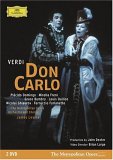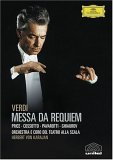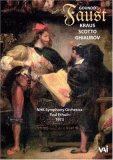 Verdi-Don Carlo | DVD | (14/11/2005)
from £19.29
| Saving you £5.69 (34.91%)
| RRP
Verdi-Don Carlo | DVD | (14/11/2005)
from £19.29
| Saving you £5.69 (34.91%)
| RRP  Verdi - Messa Da Requiem | DVD | (15/08/2005)
from £15.79
| Saving you £1.20 (7.60%)
| RRP
Verdi - Messa Da Requiem | DVD | (15/08/2005)
from £15.79
| Saving you £1.20 (7.60%)
| RRP Acknowledged to be the finest Karajan recording of this overwhelming sacred masterpiece. This 1967 performance features four of the 20th century's greatest Verdi singers - Price Cossotto and Ghiaurov were at the peak of their careers while the young Pavarotti was still comparatively unknown (though not for long).
![Puccini: La Boheme -- San Francisco/Severini [1988]](/pictures/1028792.jpg) Puccini: La Boheme -- San Francisco/Severini | DVD | (28/08/2000)
from £14.98
| Saving you £10.01 (66.82%)
| RRP
Puccini: La Boheme -- San Francisco/Severini | DVD | (28/08/2000)
from £14.98
| Saving you £10.01 (66.82%)
| RRP One way to use the DVD format for opera is to provide a video format with a clear picture and sumptuous sound and let a good performance speak more or less for itself. Severini's La Boheme comes with a minimum of trimmings--subtitles in English, French and German; even a short account of the performance history is relegated to text in a booklet. The live performance has real theatrical presence, even to the extent that, at times, the vocal and orchestral subtleties get lost in wild applause. Pavarotti's Rodolfo was, in 1988, as plangently lyrical as ever and Freni's care-worn Mimi is a deeply touching and musical performance; Pacetti is a beefy full-blooded no-nonsense Musetta--the waltz song and ensuing duet with Marcello is for once the Broadway show-stopper it ought to be. Of the supporting roles, though, perhaps the most moving is Ghiaurov's Colline--his farewell to his old coat is a short passage of deep pathos which he has rarely sung as well as he does here. --Roz Kaveney
![Tchaikovsky: Eugene Onegin -- film version/Solti [1988]](/pictures/1028525.jpg) Tchaikovsky: Eugene Onegin -- film version/Solti | DVD | (03/06/2002)
from £19.99
| Saving you £-3.00 (N/A%)
| RRP
Tchaikovsky: Eugene Onegin -- film version/Solti | DVD | (03/06/2002)
from £19.99
| Saving you £-3.00 (N/A%)
| RRP It's a common complaint that opera singers can't act, and actors can't sing opera. In this handsome 1988 film of Tchaikovsky's opera Eugene Onegin, director Petr Weigl attempts to solve the problem by letting each group of performers do what they do best. Thus the music is a studio recording with some great voices in the principal roles, and the film is a lip-synched performance shot in stunning locations by a good-looking cast of players. On the positive side this means that the whole thing looks gorgeous, and sun-drenched dachas, glittering ballrooms and snowy steppes are all captured with painterly verve. The musical performances are also splendid, with Bernd Weikl making a passionate, tortured Onegin, Teresa Kubiak a honeyed, fresh-sounding Tatyana, and Solti conducting with driven intensity. But realism and opera rarely make happy bed-fellows, and the down-side of this film is that the naturalistic "speaking-style" lip-synching and understated acting are entirely at odds with the grand musical gestures, and occasionally give rise to a somewhat absurd alienation effect. Thus while Kubiak's voice is at full blast, Magdalena Vasaryova looks like she's making polite chit-chat at a cocktail party. But the project feels like a brave experiment, nonetheless, and if the whole isn't quite the sum of its different elements, those elements are still jolly good. On the DVD: Eugene Onegin on disc has excellent picture quality (which is fortunate in such a visually exquisite film), though the sound is a little distant and muffled. The film starts with the entry of the peasants in Act 1, but the DVD includes the Prologue and music before this point as an audio bonus. There are subtitles in English, French, German, Italian, Spanish and Chinese, and a series of trailers for other Decca DVDs. --Warwick Thompson
 Rossini - The Barber Of Seville | DVD | (02/01/2007)
from £29.93
| Saving you £-4.94 (N/A%)
| RRP
Rossini - The Barber Of Seville | DVD | (02/01/2007)
from £29.93
| Saving you £-4.94 (N/A%)
| RRP Rossini: Il Barbiere Di Siviglia
![Verdi: Aida -- La Scala [1986]](/pictures/1028805.jpg) Verdi: Aida -- La Scala | DVD | (28/08/2000)
from £3.51
| Saving you £17.74 (788.44%)
| RRP
Verdi: Aida -- La Scala | DVD | (28/08/2000)
from £3.51
| Saving you £17.74 (788.44%)
| RRP La Scala went all-out for its 1986 production of this grandest of grand operas, with a strong cast and--most important for a video recording--a larger-than-life staging. The Triumph Scene in Act II is by no means Aida's only attraction, but it is the part that makes the strongest and most lasting impression and it is the visual and musical climax of this production. Stage director Ronconi brings on a procession to dwarf all processions: looted treasures, heroic statuary, miserable captives struggling under the lash of whip-bearing slave-drivers. On par with these visuals is Lorin Maazel's first-class performance of the popular "Grand March" with the outstanding La Scala chorus and orchestra. In Act III, the contrasting tranquillity of the Nile Scene also gets a visual treatment to match the music's qualities.When it is not an epic spectacle, Aida is a tragic story of love, jealousy and horrible revenge. The shifting focus between vast spectacle and intimate moments-sometimes awkward in a live performance onstage--presents special opportunities and challenges for a video recording. In this Aida, the camera work shows an acute awareness of those opportunities and challenges. The soloists have a variety of strengths that outweigh a few small weaknesses. Luciano Pavarotti sings one of his signature roles in superb voice, but his weight problems are visually evident and detract from his impact as the dashing hero Radames. Maria Chiara has moments of vocal imperfection but gives a dramatically compelling performance. Ghena Dimitrova sings powerfully and the supporting cast is excellent throughout. --Joe McLellan, Amazon.com
 La Boheme | DVD | (30/11/1999)
from £37.20
| Saving you £-18.74 (-101.50%)
| RRP
La Boheme | DVD | (30/11/1999)
from £37.20
| Saving you £-18.74 (-101.50%)
| RRP One way to use the DVD format for opera is to provide a video format with a clear picture and sumptuous sound and let a good performance speak more or less for itself. Severini's La Boheme comes with a minimum of trimmings--subtitles in English, French and German; even a short account of the performance history is relegated to text in a booklet. The live performance has real theatrical presence, even to the extent that, at times, the vocal and orchestral subtleties get lost in wild applause. Pavarotti's Rodolfo was, in 1988, as plangently lyrical as ever and Freni's care-worn Mimi is a deeply touching and musical performance; Pacetti is a beefy full-blooded no-nonsense Musetta--the waltz song and ensuing duet with Marcello is for once the Broadway show-stopper it ought to be. Of the supporting roles, though, perhaps the most moving is Ghiaurov's Colline--his farewell to his old coat is a short passage of deep pathos which he has rarely sung as well as he does here. --Roz Kaveney
![Rossini: Il Barbiere di Siviglia (The Barber of Seville) -- Zurich [2001]](/pictures/1028580.jpg) Rossini: Il Barbiere di Siviglia (The Barber of Seville) -- Zurich | DVD | (04/02/2002)
from £N/A
| Saving you £N/A (N/A%)
| RRP
Rossini: Il Barbiere di Siviglia (The Barber of Seville) -- Zurich | DVD | (04/02/2002)
from £N/A
| Saving you £N/A (N/A%)
| RRP The 2001 Zurich production of Il Barbiere di Siviglia has many strengths, but the point of it is ultimately Vesselina Kasarova's vocal gymnastics as Rosina; when you cast a singer with so very steely a voice in the part you expect something special, and we are not disappointed. Her acting is perhaps a little arch--this is a very knowing Rosina, though no more so than such rivals in the part as Baltsa and Bartoli--but she gives a ferocious point and precision to every note and every word. This is a production with touches of luxury casting: Nicolai Ghiaurov is on hand to give Basilio's slander aria an apocalyptic aspect it rarely has; less known singers like Reinaldo Macias as Almaviva and Manuel Lanza as Figaro are entirely in the same league as far as vocal quality goes. Veteran conductor Nello Santi gives the performance real vigour; not a note of this comic standard sounds routine. The production, set in early 20th century Spain, makes imaginative use of a revolving stage and sets whose stylised fan motif give it a toy theatre feel. On the DVD Il Barbiere di Siviglia on disc offers a choice of Dolby Digital, PCM stereo and DTS surround sound and is presented with a widescreen visual aspect of 16:9; the picture quality is unremarkable and the sound wonderfully clear in all formats. --Roz Kaveney
 Khovanshchina | DVD | (29/03/2004)
from £36.43
| Saving you £-6.44 (-21.50%)
| RRP
Khovanshchina | DVD | (29/03/2004)
from £36.43
| Saving you £-6.44 (-21.50%)
| RRP Modest Mussorgsky's opera 'Khovanshchina' performed by the Vienna State Opera and Chorus and the Slovak Philharmonic Chorus from Bratislava; conducted by Claudio Abbado.
 Gounod - Faust, Live 1973 (Kraus, Scotto, Nhk) | DVD | (02/08/2007)
from £11.39
| Saving you £13.60 (119.40%)
| RRP
Gounod - Faust, Live 1973 (Kraus, Scotto, Nhk) | DVD | (02/08/2007)
from £11.39
| Saving you £13.60 (119.40%)
| RRP ![Verdi - Requiem [1967]](/pictures/1028627.jpg) Verdi - Requiem | DVD | (15/10/2001)
from £N/A
| Saving you £N/A (N/A%)
| RRP
Verdi - Requiem | DVD | (15/10/2001)
from £N/A
| Saving you £N/A (N/A%)
| RRP ![Opera Legends: Nicolai Ghiauro [DVD] [2010]](/pictures/1129914.jpg) Opera Legends: Nicolai Ghiauro | DVD | (20/06/2011)
from £N/A
| Saving you £N/A (N/A%)
| RRP
Opera Legends: Nicolai Ghiauro | DVD | (20/06/2011)
from £N/A
| Saving you £N/A (N/A%)
| RRP Nicolai Ghiaurov - Tribute to a Great Basso With Mirella Freni, Jose Carreras, Herbert Von Karajan, & Piero Cappuccilli. Nicolai Ghiaurov was an opera singer from Bulgaria who rose to become one of the predominant bass singers of the 20th Century. He performed alongside virtually all of opera's superstars, including Pavaroti, Sutherland, Domingo, Tebaldi, Corelli, Caballe, Raimondi and many more. His triumphant career brought him to world famous stages across the globe, performing with equa...

Please wait. Loading...
This site uses cookies.
More details in our privacy policy